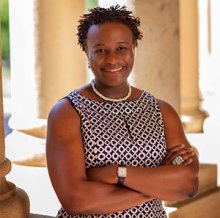Dean Carter will discuss why “equal opportunity” has become a mantra in U.S. society but how diversity efforts still fall short of this goal. While studies show the powerful effects of diversity on innovation and creativity, it is neither inclusion nor integration. Carter will argue why diversity is necessary but insufficient for achieving equity and inclusion. Even in diverse educational and work environments, everyday organizational practices can often unwittingly perpetuate isolation, social exclusion, and limited mobility. Carter will ask us to consider what it will take to create vibrant, inclusive professional and educational organizations that yield significant contributions from all represented groups and that have the potential to reduce social inequality.
Why Inclusion Is Not Diversity: Distinguishing Between Demographics and Organizational Structures
Prudence L. Carter is Dean and Professor of the Graduate School of Education at the University of California, Berkeley. Dr. Carter’s research agenda focuses on causes of and solutions to enduring social and cultural inequalities among social groups, especially in education and schooling. Specifically, she examines academic and mobility differences influenced by the dynamics of race, ethnicity, class, and gender in the U.S. and global society. Her expertise spans issues of youth identity and educational well-being; urban poverty; social and cultural inequality, and the sociocultural and organizational contexts of schools.
Dr. Carter is the author the award-winning Keepin’ It Real: School Success beyond Black and White (2005), and Stubborn Roots: Race, Culture, and Inequality in U.S. & South African Schools (2012) and co-editor of Closing the Opportunity Gap: What American Must Do to Give Every Child an Even Chance (2013), all published by Oxford University Press, along with numerous articles and book chapters. She is an elected a member of the National Academy of Education, the Sociological Research Association, and a Fellow of the American Educational Research Association (AERA). She also serves on the Board of Trustees for the William T. Grant Foundation where she chairs the Program Committee.
